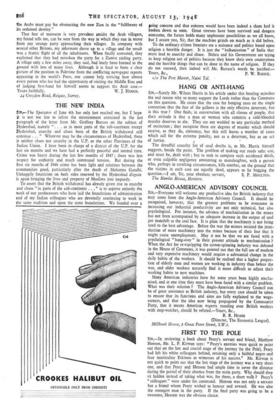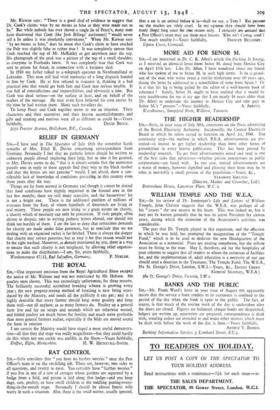FIRST TO THE POLE
STR,—In reviewing a book about Peary's servant and friend, Matthew Henson, Mr. L. P. Kirwan says: "Peary's enemies were quick to point out that on the last and crucial stage of the journey (to the Pole), Peary had left his white colleagues behind, retaining only a faithful negro and four inarticulate Eskimos as witnesses of his success." Mr. Kirwan is not quick to point out that the last stage of the journey was a very short one, and that Peary and Henson had ample time to cover the distance during the period of their absence from the main party. Why should they sit hidden instead of taking what was, for them, a short walk ? Peary's " colleagues " were under his command. Henson was not only a servant but a friend whom Peary wished to honour and reward. He was also the strongest man in the party. If the final party was going to be a twosome, Henson was the obvious choice.
Mr. Kirwarr says: "There is -a good deal of evidence to suggest that Dr. Cook's claims were by no means as false as they were made out to be." • But while nobody has ever shown a single lie of Peary's, many men have discovered that Cook (like Josh Billings' auctioneer) "would never tell a lie unless it was absolutely convenient!' When Mr. Kirwan says "by no means as false," does he mean that Cook's claim to have reached the Pole was slightly false or rather true ? It was completely untrue that Cook reached the top of Mt. McKinley or got anywhere near the top. His photograph of the peak was a picture of the top of a small shoulder, as everyone in Fairbanks knew. It was completely true that Cook was sent to prison for fraud, in connection with a business deal.
In 1910 my father talked to a.-telegraph operator in Newfoundland or Labrador. This man still had vivid memories of a long dispatch handed to him by Cook. He at first refused to transmit it, thinking it a bad practical joke that would get both him and Cook into serious trouble. It was full of contradictions and impossibilities, and obviously a joke. But Cook was dead serious—on the surface at least, and on behalf of the readers of the message. He may even have believed his own stories by the time he had written them. Many such travellers do.
To lump Peary and Cook together seems to me an injustice. Their characters and their narratives and their known accomplishments and gifts and training and motives were all as different as could be.—Yours



































 Previous page
Previous page